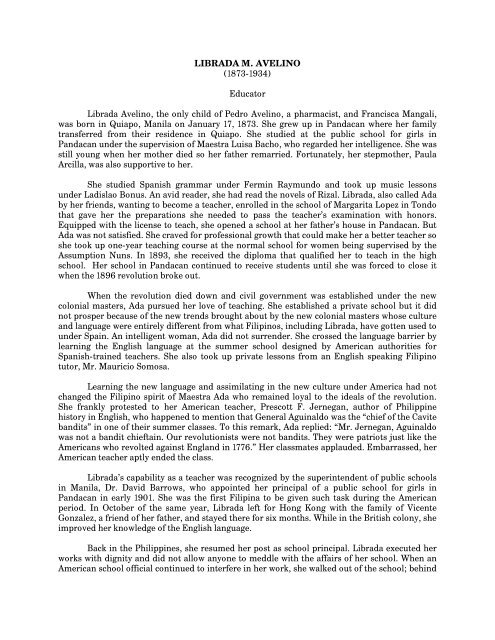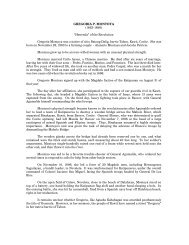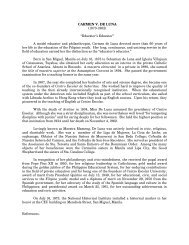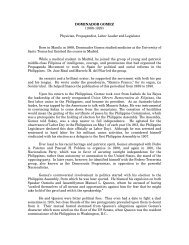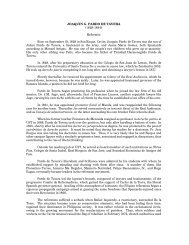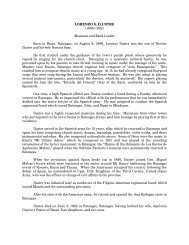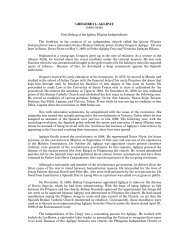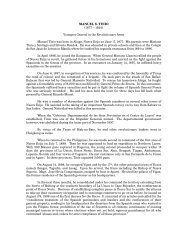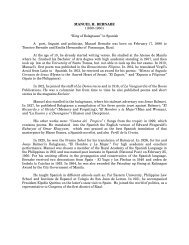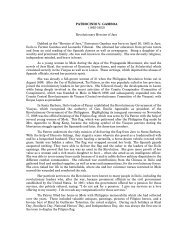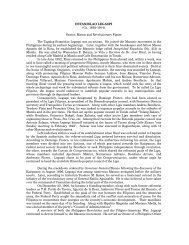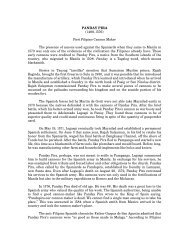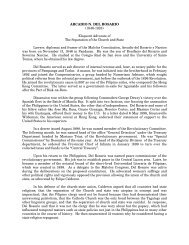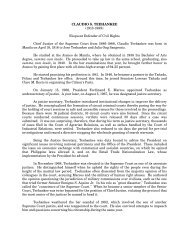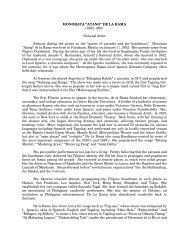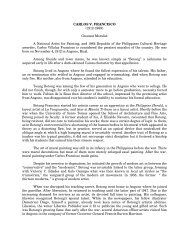LIBRADA M. AVELINO (1873-1934) Educator Librada Avelino, the ...
LIBRADA M. AVELINO (1873-1934) Educator Librada Avelino, the ...
LIBRADA M. AVELINO (1873-1934) Educator Librada Avelino, the ...
You also want an ePaper? Increase the reach of your titles
YUMPU automatically turns print PDFs into web optimized ePapers that Google loves.
<strong>LIBRADA</strong> M. <strong>AVELINO</strong><br />
(<strong>1873</strong>-<strong>1934</strong>)<br />
<strong>Educator</strong><br />
<strong>Librada</strong> <strong>Avelino</strong>, <strong>the</strong> only child of Pedro <strong>Avelino</strong>, a pharmacist, and Francisca Mangali,<br />
was born in Quiapo, Manila on January 17, <strong>1873</strong>. She grew up in Pandacan where her family<br />
transferred from <strong>the</strong>ir residence in Quiapo. She studied at <strong>the</strong> public school for girls in<br />
Pandacan under <strong>the</strong> supervision of Maestra Luisa Bacho, who regarded her intelligence. She was<br />
still young when her mo<strong>the</strong>r died so her fa<strong>the</strong>r remarried. Fortunately, her stepmo<strong>the</strong>r, Paula<br />
Arcilla, was also supportive to her.<br />
She studied Spanish grammar under Fermin Raymundo and took up music lessons<br />
under Ladislao Bonus. An avid reader, she had read <strong>the</strong> novels of Rizal. <strong>Librada</strong>, also called Ada<br />
by her friends, wanting to become a teacher, enrolled in <strong>the</strong> school of Margarita Lopez in Tondo<br />
that gave her <strong>the</strong> preparations she needed to pass <strong>the</strong> teacher’s examination with honors.<br />
Equipped with <strong>the</strong> license to teach, she opened a school at her fa<strong>the</strong>r’s house in Pandacan. But<br />
Ada was not satisfied. She craved for professional growth that could make her a better teacher so<br />
she took up one-year teaching course at <strong>the</strong> normal school for women being supervised by <strong>the</strong><br />
Assumption Nuns. In 1893, she received <strong>the</strong> diploma that qualified her to teach in <strong>the</strong> high<br />
school. Her school in Pandacan continued to receive students until she was forced to close it<br />
when <strong>the</strong> 1896 revolution broke out.<br />
When <strong>the</strong> revolution died down and civil government was established under <strong>the</strong> new<br />
colonial masters, Ada pursued her love of teaching. She established a private school but it did<br />
not prosper because of <strong>the</strong> new trends brought about by <strong>the</strong> new colonial masters whose culture<br />
and language were entirely different from what Filipinos, including <strong>Librada</strong>, have gotten used to<br />
under Spain. An intelligent woman, Ada did not surrender. She crossed <strong>the</strong> language barrier by<br />
learning <strong>the</strong> English language at <strong>the</strong> summer school designed by American authorities for<br />
Spanish-trained teachers. She also took up private lessons from an English speaking Filipino<br />
tutor, Mr. Mauricio Somosa.<br />
Learning <strong>the</strong> new language and assimilating in <strong>the</strong> new culture under America had not<br />
changed <strong>the</strong> Filipino spirit of Maestra Ada who remained loyal to <strong>the</strong> ideals of <strong>the</strong> revolution.<br />
She frankly protested to her American teacher, Prescott F. Jernegan, author of Philippine<br />
history in English, who happened to mention that General Aguinaldo was <strong>the</strong> “chief of <strong>the</strong> Cavite<br />
bandits” in one of <strong>the</strong>ir summer classes. To this remark, Ada replied: “Mr. Jernegan, Aguinaldo<br />
was not a bandit chieftain. Our revolutionists were not bandits. They were patriots just like <strong>the</strong><br />
Americans who revolted against England in 1776.” Her classmates applauded. Embarrassed, her<br />
American teacher aptly ended <strong>the</strong> class.<br />
<strong>Librada</strong>’s capability as a teacher was recognized by <strong>the</strong> superintendent of public schools<br />
in Manila, Dr. David Barrows, who appointed her principal of a public school for girls in<br />
Pandacan in early 1901. She was <strong>the</strong> first Filipina to be given such task during <strong>the</strong> American<br />
period. In October of <strong>the</strong> same year, <strong>Librada</strong> left for Hong Kong with <strong>the</strong> family of Vicente<br />
Gonzalez, a friend of her fa<strong>the</strong>r, and stayed <strong>the</strong>re for six months. While in <strong>the</strong> British colony, she<br />
improved her knowledge of <strong>the</strong> English language.<br />
Back in <strong>the</strong> Philippines, she resumed her post as school principal. <strong>Librada</strong> executed her<br />
works with dignity and did not allow anyone to meddle with <strong>the</strong> affairs of her school. When an<br />
American school official continued to interfere in her work, she walked out of <strong>the</strong> school; behind
her were <strong>the</strong> Filipino students. She filed her resignation despite <strong>the</strong> pleas of Superintendent O’<br />
Reilly for her to stay and his promised to increase her salary<br />
A teacher by heart, <strong>Librada</strong> <strong>Avelino</strong>, toge<strong>the</strong>r with Carmen de Luna, and Fernando Salas,<br />
established <strong>the</strong> Centro Escolar de Señoritas, which opened in April 1907 with only 118 girls but<br />
in time gained its university status. Today, this school is known as <strong>the</strong> Centro Escolar University.<br />
In 1929, <strong>the</strong> University of <strong>the</strong> Philippines, <strong>the</strong>n under Dr. Rafael Palma, conferred to her <strong>the</strong><br />
Master of Pedagogy, honoris causa, in 1929. In <strong>the</strong> investiture, she was cited for having “built up<br />
in <strong>the</strong> face of adverse circumstances, an institution that has for a generation been a potent<br />
influence for good in <strong>the</strong> Filipino home and national life.”<br />
On November 9, <strong>1934</strong>, <strong>Librada</strong> died of stomach cancer. In her honor, <strong>the</strong> Centro Escolar<br />
University established <strong>the</strong> <strong>Librada</strong> <strong>Avelino</strong> Memorial Awards for outstanding women leaders in<br />
Asia.<br />
References:<br />
Ancheta, Herminiana M. and Michaela Beltran-Gonzalez, Filipino Women in Nation Building,<br />
Phoenix Press, Inc. Quezon City, 1984.<br />
Varias,-de Guzman, Jovita, Ed. Women of Distinction : Biographical Essay on Outstanding<br />
Filipino Women of <strong>the</strong> Past and <strong>the</strong> Present. Philippines : Bukang Liwayway, 1967.<br />
Zaide, Gregorio. Great Filipinos in History. Manila: Verde Bookstore, 1970.


